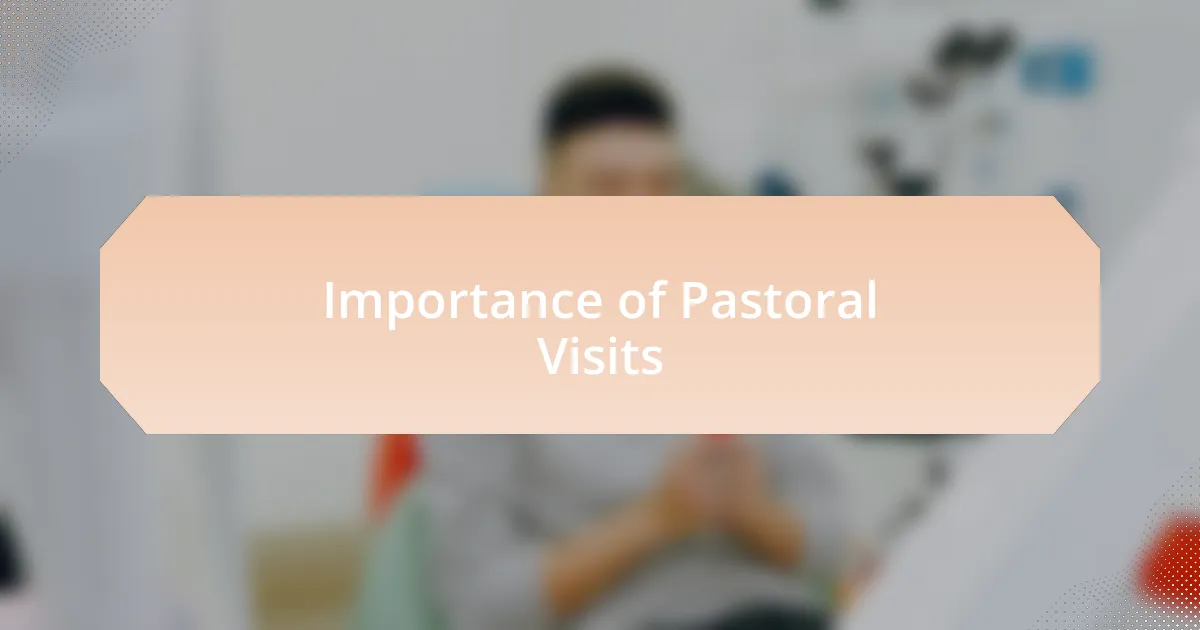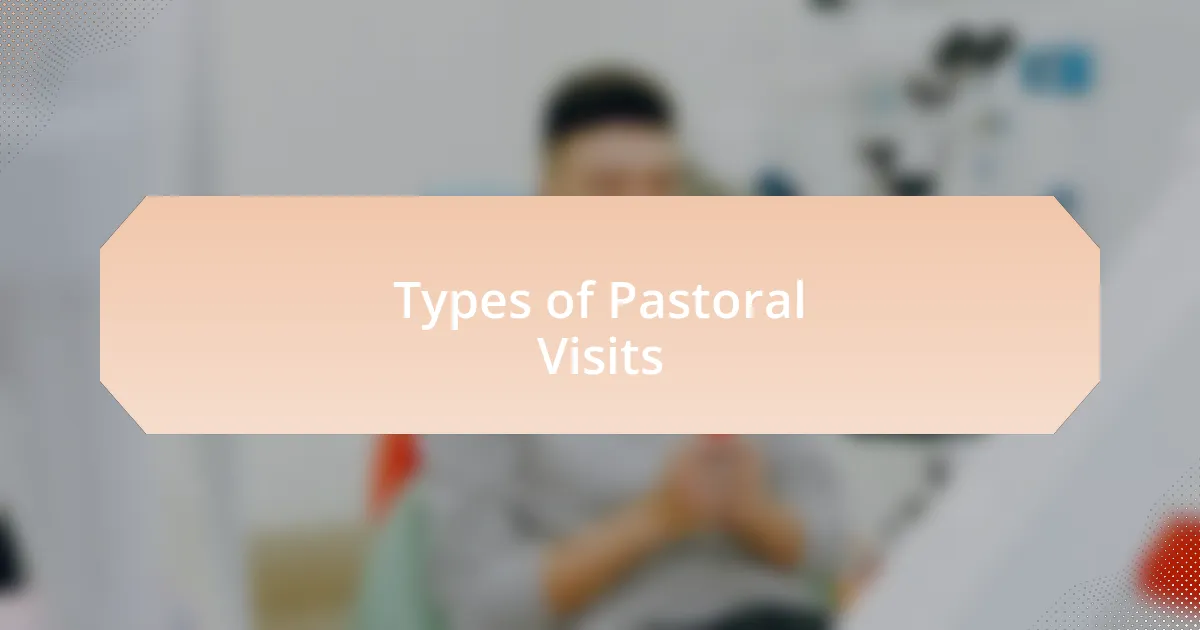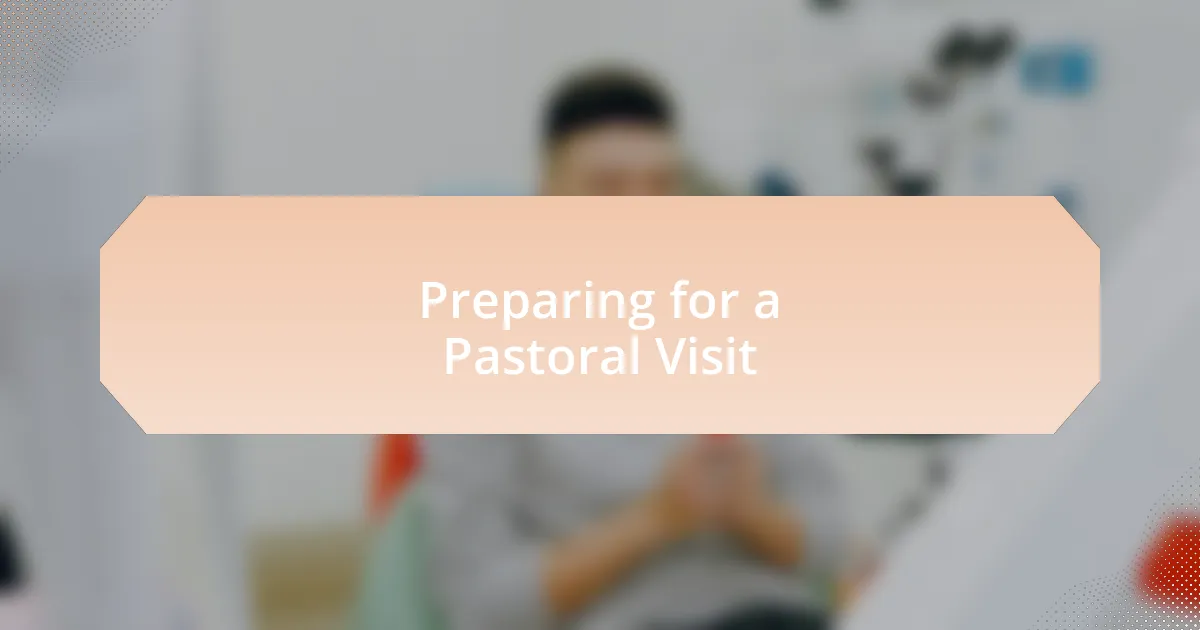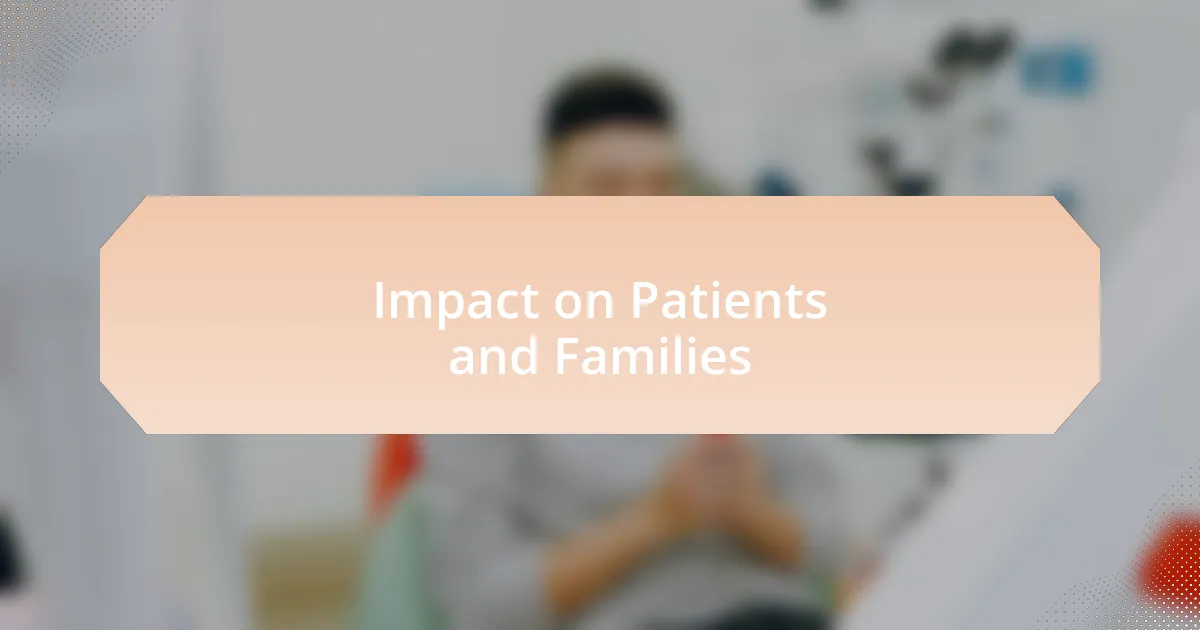Key takeaways:
- Hospital ministry emphasizes the importance of presence and compassionate listening, often providing comfort beyond words.
- Pastoral visits reveal unspoken needs, fostering emotional and spiritual support, which promotes holistic healing.
- Different types of visits, whether in crisis, routine, or celebrations, cultivate meaningful connections and stability for patients and families.
- Active listening and shared experiences create a safe space for healing, highlighting the profound impact of empathy and connection amidst distress.

Understanding Hospital Ministry
Hospital ministry is a profound expression of compassion and service, reaching out to individuals in their most vulnerable moments. I recall a time I entered a patient’s room filled with uncertainty; their fear was palpable. As I sat and simply listened, I realized that sometimes, being present is more powerful than any words we could share.
The essence of hospital ministry revolves around fostering a sense of hope and connection. I once had a patient who, despite their physical pain, wanted to talk about their cherished memories. That conversation not only uplifted their spirit but also taught me the importance of focusing on the person beyond their illness. Have you ever experienced that moment where a small act of kindness seemed to light up a dark room?
Engaging with patients and their families often means navigating complex emotions—fear, hope, confusion. While visiting a family grappling with a loved one’s critical condition, I felt an overwhelming need to provide not just spiritual support but also practical comfort. It reminded me that hospital ministry is more than just prayers; it’s about being a steady presence amid chaos and uncertainty.

Importance of Pastoral Visits
Pastoral visits hold immense significance in the hospital setting as they cultivate a compassionate relationship between the caregiver and the patient. I remember a time when I visited a nursing home with the aim of checking in on a longtime parishioner who had transitioned there. The warmth of our connection was not lost on me; I could see how much my presence buoyed her spirits, reminding me that a visit can sometimes serve as a lifeline.
Moreover, these visits can reveal the unspoken needs of patients and families alike. I once sat with a mother whose child was undergoing surgery. As we talked, she shared her feelings of isolation and fear about the surgery. This conversation not only deepened our bond but also allowed me to provide her with resources and support, reinforcing that emotional and spiritual care goes hand in hand.
The importance of pastoral visits is also highlighted by their impact on holistic healing. I recall being with a young man grappling with anxiety about his upcoming treatments. By engaging in a heartfelt dialogue, he found not only comfort but also a renewed sense of hope. Isn’t it fascinating how a simple exchange can create space for healing beyond the physical realm?

Types of Pastoral Visits
When I think about the different types of pastoral visits, caregiving in crisis moments stands out. I recall a time when I was called to the emergency room, where a family was grappling with a sudden loss. Walking into that tense atmosphere, I felt the weight of their grief. My presence alone provided a small measure of comfort. I often wonder how much a simple visit can mean to those facing such heavy burdens.
Another type of visit involves routine check-ins, which can foster ongoing relationships. For instance, I regularly visited a patient struggling with chronic illness, and over time, our conversations became a source of encouragement for him. He would wait for me, and I would ask about his family and hobbies, allowing him to momentarily step away from his health issues. Isn’t it remarkable how these regular connections can provide stability in the midst of uncertainty?
Lastly, I’ve engaged in what I call celebratory visits, which occur during milestone moments such as birthdays or anniversaries. I remember surprising a patient with a small birthday cake and singing alongside their family. The joy on their face was priceless, and in that moment, we celebrated life together. It reinforced my belief that pastoral care isn’t just about addressing the hard times; it’s also about cherishing the joyful moments in life. How often do we take the time to celebrate together in the midst of difficult journeys?

Preparing for a Pastoral Visit
Preparing for a pastoral visit involves both practical considerations and emotional readiness. I always start by gathering information about the individual I’m visiting. This can include their current situation, preferences, and any recent changes in their life. For instance, I remember one visit where I learned about the patient’s love for gardening. Bringing along some flowers for her to enjoy not only brightened her day but also created an instant connection. How do you think small details can make a visit feel more personal?
Beyond the logistical side, I believe it’s essential to approach a pastoral visit with an open heart and mind. I often take a moment to pray or reflect on the purpose of my visit before arriving. There was a time when I stepped into a room filled with silence after a severe diagnosis, and I realized that my calm presence could offer unspoken support. Have you ever felt that stillness and recognized its power in providing comfort?
Lastly, I prepare mentally for unexpected turns during conversations. Some visits lead to moments of deep sorrow, while others might spark laughter and joy. I once found myself discussing cherished memories with an elderly man who seemed to light up as he recalled his childhood adventures. It reminded me that being ready for anything is key. Isn’t it incredible how a single conversation can lead us down unexpected paths of connection?

Personal Stories from Pastoral Visits
During one of my pastoral visits, I encountered a young mother grappling with loneliness and fear as she faced a health crisis. As we spoke, I noticed her shoulders slowly relax, almost as if she was shedding the weight of her worries. It struck me how simply being present and sharing a cup of tea could transform the atmosphere—who knew a warm beverage could bridge such emotional gaps?
Another memorable experience occurred when I visited a gentleman who was a World War II veteran. He began sharing stories from his past, his eyes lighting up with each memory. I was surprised at how quickly the conversation shifted from his current struggles to tales of bravery and camaraderie. It made me realize that tapping into a person’s life history can revive their spirit—have you ever witnessed the power of nostalgia in rekindling someone’s joy?
On a different visit, I met a teenager overwhelmed by the pressure of exams and personal expectations. I listened as she expressed her fears and insecurities, and as she spoke, I felt a profound urge to remind her of her strengths. In that moment, I understood the importance of affirmation; at times, we all need someone to reflect our worth back to us. How often do we forget to affirm those we care about?

Lessons Learned from Hospital Ministry
Visiting patients in the hospital has taught me the invaluable lesson of active listening. One day, I sat with an elderly woman who spoke about her late husband. As she reminisced, tears glistened in her eyes, but when I offered her a moment of silence to collect her thoughts, her gratitude was palpable. This experience reinforced my belief that sometimes, it’s not about finding the right words to say, but rather about creating a safe space for healing through attentive listening.
On another occasion, I accompanied a family as they navigated the emotional turmoil of receiving a serious diagnosis. I noticed how fear can cloud judgment and foster despair. I shared a simple story of hope from my own life, and suddenly, the weight in the room shifted. This taught me that vulnerability can connect us deeply. Have you ever felt the power of shared experiences to uplift those in distress?
One lesson that stands out is the gift of compassion. I recall a visit where I met a young man grappling with thoughts of hopelessness. After our conversation, he thanked me for just being there. It dawned on me how crucial it is to express empathy, as our presence can serve as a light in someone’s darkest moments. How often do we remind ourselves of the simple yet profound impact of being there for others?

Impact on Patients and Families
During my pastoral visits, I’ve often witnessed the profound impact a simple presence can have on both patients and their families. I recall a day spent with a mother whose child was undergoing surgery. As we sat together, her anxiety was tangible. Just holding her hand seemed to ease her fear, if only for a moment. It led me to wonder: how often do we underestimate the comfort that connection can bring in times of crisis?
I’ve also seen how a pastoral visit can strengthen family bonds amidst stress. One evening, I joined a family gathered around their loved one, their faces shadowed by worry. I facilitated a brief conversation where each one shared their favorite memory with the patient, igniting laughter and warmth in an otherwise somber atmosphere. In that moment, I realized that these moments of joy, no matter how fleeting, could unify families, reminding them of their shared love. Isn’t it fascinating how reminiscence can become a healing balm during troubling times?
Moreover, my interactions often reveal that the emotional support provided to families extends beyond the hospital walls. There was a father who, after our chat, expressed how revitalized he felt from sharing his burdens. He commented that just knowing someone cared encouraged him to tackle each day with renewed strength. This made me reflect: what if we all took a moment to reach out and check in on those who are caring for loved ones? The positive ripple effects can be monumental.